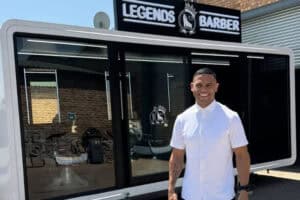Hair has always been an interesting topic, from debates around whether or not women should wear weaves, or discussions about how straightening your hair could strip you of your "African identity."

Conversations around black women and hair have found it difficult to expand beyond the stringent parameters of race, politics and even the apparently innocent stereotypical jokes that go with those subjects.
But the launch of the first Healthy Hair Indaba last week presented a refreshing new angle. Instead of dissecting the political messages, or preaching about what modern women should or shouldn’t be doing with their hair, the panel (made up of hair bloggers from around the world) chose to focus on what most women are concerned with when it comes to hair – how to take good care of it.
Speaking of their own personal hair journeys, the “healthy hair gurus” shared haircare tips, tried to come up with solutions for common hair problems such as receding hairlines and also set out to bust some of the myths around black women’s hair.
“I think it’s important to set your own standard of beauty,” says hair blogger and writer Carice Anderson.
“Whether you like wearing weaves, plaits or relaxed hair, you should be comfortable with it and know how to maintain it.”
“My philosophy is, whatever you do with your hair, do it in the healthiest way possible,” said Kavuli Binase, who also sat on the panel.
With women taking full advantage of the variety of hairstyles available to them one of the biggest hair care problems is inadequate moisturising.
“Weaves and braids are great protective hairstyles because they give your hair a break from pulling, thus minimising breakage,” says Anderson.
“But its also important to take care of your natural hair while wearing a protective hairstyle.”
The scalp should be moisturised at least once every two days, says the panel. Because natural African hair is coiled at the root, it is difficult for moisture to reach the tips of the hair, making it important to moisturise hair from root to tip.
While the protective hairstyles are funky and convenient, if the hairstyle is not removed within six weeks at the most, it could damage your hair.
“People tend to think that because natural African hair is coarse, so it must be strong enough to handle anything,” says Aisha Mchumo, “but it’s actually very gentle and you need to handle it with care.”
Many women in attendance agreed, saying that they straightened their hair because their natural hair was too coarse, making it painful to comb.
“The biggest lesson I’ve learned about my natural hair is that it doesn’t take well to being combed while its dry,” Mchumo says.
“If your hair is too coarse to comb, then you should wet it with leave in conditioner before combing it. But combing your hair shouldn’t be a painful process.”
Interestingly, all but one of the six panellists were very proud to declare that they had only their natural hair on their heads.
“Many of us grew up with relaxed hair,” says Londi Magwazwa, one of the guests.
“As children, our mothers would make the decision to start relaxing our hair simply because it seemed to be the easiest way to manage it.
“So a lot of women only start wearing their natural hair when they’re old enough to take care of themselves. For me, deciding to go natural was a symbol of independence.”
Support Local Journalism
Add The Citizen as a Preferred Source on Google and follow us on Google News to see more of our trusted reporting in Google News and Top Stories.








